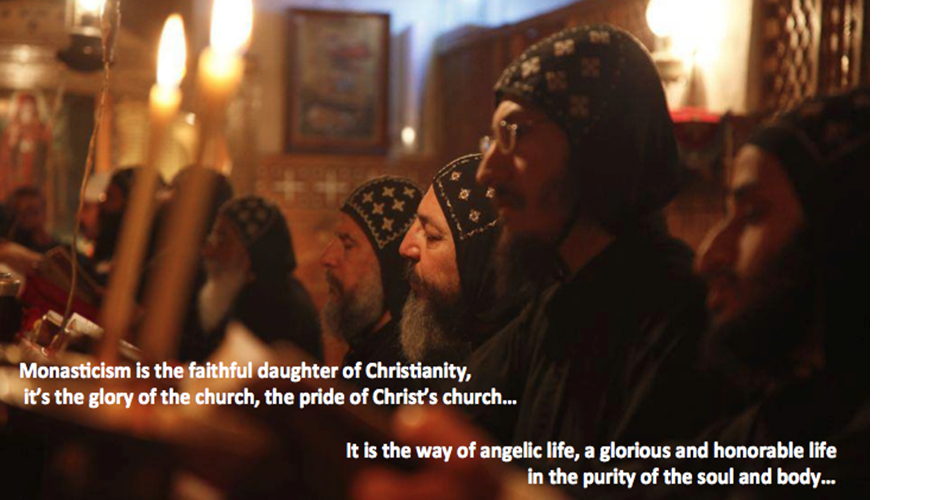Monasticism is the backbone of the church that protects it and carries it just like how Moses was to Joshua in his fight against Amalek. Moses is a symbol of monasticism which lifts its hands towards heaven to pray for Joshua who symbolises the servants, the consecrated and the clergy while he fought Amalek who …
Monasticism is the backbone of the church that protects it and carries it just like how Moses was to Joshua in his fight against Amalek. Moses is a symbol of monasticism which lifts its hands towards heaven to pray for Joshua who symbolises the servants, the consecrated and the clergy while he fought Amalek who symbolise the devil (Exodus 17:8-13). And so it was that when Moses held up his hand that Joshua prevailed and when he let it down, Amalek prevailed. For the victory of the church, the servant and the fighter in this world rests on the hands held up in the desert pleading to God for the church.
For the monks are Jerusalem’s (church’s) guard who cry out to God night and day, to further establish the church so that it may become a praise in the whole earth: “I have set watchmen on your walls O Jerusalem; They shall never hold their peace day or night. You who make mention of the Lord, do not keep silent, and give Him no rest till He establishes and till He makes Jerusalem a praise in the earth” (Isaiah 62:6-7).
From there we can say that monasticism is a necessity especially outside of Egypt in countries of immigration. In these countries worldliness has spread at an alarming rate, the dollar has become a god and a lord to millions of people that it became impossible to worship both God and money just like what our Lord said “No servant can serve two masters; for either he will hate the one and love the other, or else he will be loyal to the one and despise the other. You cannot serve God and mammon” (Luke 16:13). From there we can see the importance of the role of monasticism in fighting this god (money) through a life of asceticism and deprivation (stripping all that is worldly) as a witness to the whole world that God should be worshiped (Matthew 4:10). These were the words that Jesus used to fend off the devil of money and acquisitiveness.
Sin and corruption has spread and is now accepted by society as the norm. Like a web, it has trapped many who sought after the fulfilment of their worldly desires leaving behind their chastity they fell under the control of a cruel and merciless god: “whose god is their belly, and whose glory is in their shame” (Philippians 3:19). Monasticism is an example of the life of chastity, discipline and control over our worldly desires, because true satisfaction can only be achieved by becoming one with God, who is the source of water for the thirsty and whoever drinks from it will never thirst (John 4:14).
Through the vow of virginity and chastity monasticism is a witness for this unfastened world that there is need for only one (Luke 10:42) and we cannot live by bread alone, but by every word that proceeds from the mouth of God (Mathew 4:4).
A third cruel and frightening god has also appeared the god of oneself. Greed has spread and it became common for people to say “Am I my brother’s Now Available keeper?” (Genesis 4:9). Since there is no love where there is greed, gone are the selfless acts of love (Agahpy) and replaced with lustful love (Eros) with the purpose of self-worship and the satisfaction of one’s desires. What’s astonishing is that this god (selfishness) asks for the blessing and protection of its desires from God (Mathew 4:6) not realising that the absence of love is the absence of God, for God is love (1 John 4:8). For the vow of obedience and self-control in monasticism is a witness against the god of greed, which does not only attempt to replace God, but dares to tempt him while monasticism cries “You shall not tempt the Lord your God” (Mathew 4:7).
It becomes clear that monasticism in countries of immigration is a necessity, as a practical example of the application of God’s commandments against the gods of money, greed and selfishness. We have witnessed the blessings which were brought by the spread of monasticism outside of Egypt. Monks are living examples for the people to follow, resulting in many cases of repentance that were initiated from within these monasteries. Monasteries became a place of peace, a retreat for those seeking asylum at the feet of the Lord away from the noise of this world and its troubles that not only choke God’s word in a person, but the person themselves (Luke 8:14).
We put these blessings and challenges in the hands of God requesting the guidance of the Holy Spirit so that these monasteries can fulfil their mission in being a living witness for Christ and to become victorious against the devil that constantly targets God’s people, but can never defeat them.
Join Us: Sign Up Today!
Tags:











